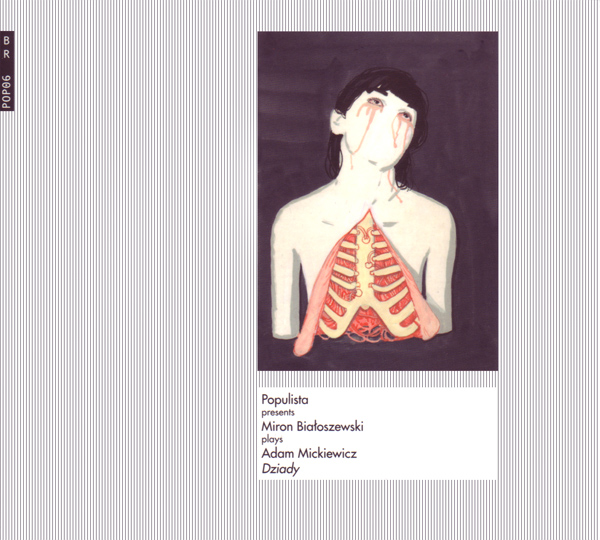|
Miron Białoszewski plays Adam Mickiewicz Dziady

|
Release Date: V 2012
Total Time: 52:13
CD | ecopack
Dziady II (pełna wersja)
1. Ciemno wszędzie, głucho wszędzie 2:30
2. Patrzcie, ach, patrzcie do góry 3:21
3. Już straszna północ przybywa 1:11
4. Hej, kruki, sowy, orlice! 4:20
5. Sarmo żebrze, darmo płacze 2:39
6. Nie lubisz umierać z głodu! 1:31
7. Nie ma, nie ma dla mnie rady! 1:19
8. Podajcie mi, przyjaciele 1:47
9. Na głowie ma kraśny wianek 4:01
10. Czego potrzebujesz duszeczko 1:47
11. Teraz wszystkie dusze razem 1:12
12. Pasterko, ot tam w żałobie... 1:57
13. Gdy gardzisz mszą i pierogiem 2:28
14. To jest nad rozum człowieczy! 2:31
Dziady IV (montaż - Miron Białoszewski)
15. Kto tam stuka, kto tam stuka 2:10
16. On swoje, a ja swoje, nie widzi, nie słucha 1:39
17. I czegóż ona przede mną uciekła? 2:40
18. Oto dziesiąta wybija 2:29
19. Niech ją sumienia sztylety ranią! 2:08
20. Jedenasta wybija 3:14
Dziady III (fragment - Wielka Improwizacja)
21. Samotność - cóż po ludziach, czym śpiewak dla ludzi? 5:46
|
|
| 'Singing. Speaking. Exactly. Moreover: the kind of difference between them? Supposedly clear. But where does the border line go? Is it terminology? Is it stretching the syllables (or even sounds)? Or altering the pitch? Or rhythm? Perhaps trembling of the voice? With stretching? (...) Often we had particular speakings (calculated according to its own melody but still speakings), straightforward singing and singing-speakings, on the edge, which turned out to be pretty broad as variety of almost singings was turning out, crooning speaking, sections of monotones or the opposite - rhythmic pile-ups becoming music out of its own urge. Hence there was no point in bringing foreign, outer music, music as such - apart from acoustics of objects playing their roles or rhythm of walking (e.g., drumming buskins)'
M. Białoszewski, O tym Mickiewiczu jak go mówię, "Odra" 1967, nr 6.
|
This is how Miron Białoszewski was recollecting a performance formula created in Teatr Osobny run by him, Ludwik Hering and Ludmiła Murawska between 1955 and 1963. He used to perform one of his favorite texts there - the fourth part of "Dziady" by Adam Mickiewicz in his own montage and edit. Taking the role of a choir, his companion was Ludmiła Murawska. The same edit of the fourth part - now a solo by Białoszewski - and the same performance concept is to be found on the tape recording of "Dziady". It is the most interesting and sonically rich material among several recordings of texts by romantic authors - Mickiewicz, Słowacki and Norwid - which Białoszewski did for his own purposes in 1964 and 1965. The material on the CD consists of extensive sections of the recording of "Dziady". The only excluded part was the least sharp and intense scene I of the third part of the drama. Included are the ones stepping outside the regular model of reading and thus uniting text and sound / music. These fragments stand for the thesis that Mickiewicz and Białoszewski meet where the word "opera" looses its most obvious meaning. Formulated by Andrzej Stawar, one of the commentators of "Dziady" in Teatr Osobny, it was supposed to point out that in "Dziady" Mickiewicz was aiming at an opera. Located in a province of no opera tradition, he could not write it "properly" but only in a way he imagined it. Intention of such a twisted trajectory can only be fulfilled by equally unusual performance: mis-opera or opera-misunderstanding, something resembling the opera but only by accident and indirectly. And perhaps it was actually fulfilled by Białoszewski who - unlike Mickiewicz - knew opera very well but did not think about it while performing "Dziady".
Maciej Byliniak
Voice, objects and tape by Miron Białoszewski
Recorded by Miron Białoszewski in Warsaw on 25th of December 1965
Researched, selected and edited by Maciej Byliniak
Mixed and mastered by The Norman Conquest, Maciej Byliniak and Michał Libera
Produced by Michał Libera
Cover artwork by Aleksandra Waliszewska
Layout by Piotr Bukowski
Populista is a CD series curated by Michał Libera
more: http://patakaind.blogspot.com/ |
|